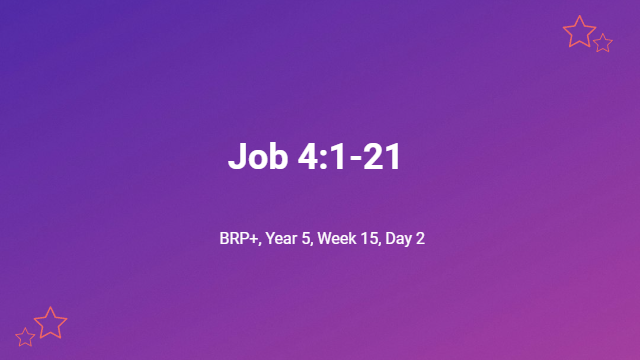Job 4:1-21
Q.1. Did Eliphaz acknowledge Job’s past? With what did he charge Job? How did he view the suffering of man? – (Job 4:1-11)
Eliphaz acknowledged that Job had done much good in the past – “But now it has come to you, and you are impatient; It touches you, and you are dismayed (Job 4:5 c.f. 4:3-4). He did not allow Job to share his heart-felt devastation over his massive losses, that included his own children and grandchildren. He virtually equated Job’s trials to the suffering of the wicked (Job 4:8-11). His view of all suffering was that it is God’s punishment for man’s lack of perfection – “Remember now, whoever perished being innocent? Or where were the upright destroyed? (Job 4:7). This would be no comfort to Job, as Eliphaz blamed him for his horrible circumstances.
Q.2. What did Eliphaz learn from his dream? How far-ranging is error? What was his view of the way in which God deals with man’s brokenness? What hope did he give sufferers? – (Job 4:12-21)
Eliphaz described a vision, that was both mysterious and disturbing (Job 4:12-16). It was unlikely to be from God, since it did not match up with any angelic messenger whose first words are always – “Fear not!” Eliphaz rightly described the sinfulness of all humanity – `Can mankind be just before God? Can a man be pure before his Maker? (Job 4:17). However, he revealed that he had a despotic view of God, believing that He crushes all imperfection and failure without explanation. That was certainly not the experience of King David after his failure, or of King Manasseh, who found favour in the eyes of the Lord after his abominable sins (2 Sam.12:1-25; 2 Chr.33:9-13; Ps.32:1-5). The view of Eliphaz gave no real hope to those who may be suffering. It overlooked God’s initiatives in restoring sinners. This was brought to light at a later time through the Gospel. This gave no relief to Job.

